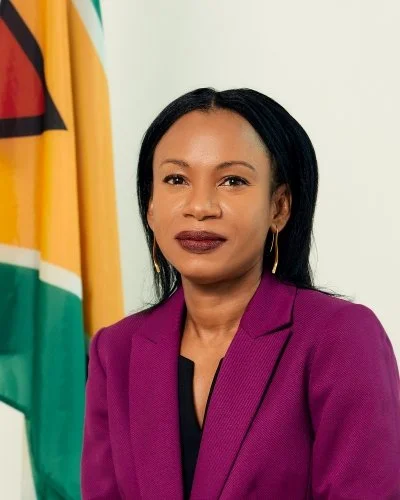Grenada hosts successful sustainable tourism conference
April 30, 2024
Inspired by the inaugural Caribbean Tourism Organization (CTO) Sustainable Tourism Conference in her native Dominica in 1997, Amanda Charles has come full circle.
The then college student quickly grasped there were other career opportunities in the tourism sector beyond working in hotels.
“I realized I could work in development, marketing and sustainability,” said Charles who was the recipient of CTO Foundation scholarships in 2006 and 2007 to pursue graduate studies in Sustainable Destination Management at George Washington University.
Since 2016, the former Association of Caribbean States Sustainable Tourism Adviser has been the CTO Sustainable Tourism Specialist.
In this role, she leads the conceptualization, planning and execution of various tourism projects and activities, spearheads the coordination and delivery of capacity-building initiatives and provides technical assistance on management issues related to tourism product development and destination stewardship.
Charles plays an integral role in resource mobilization and partnership development, directing cooperation initiatives in collaboration with various regional and international development agencies, member counties and donor partners.
She was the CTO’s official spokesperson for the just concluded Sustainable Tourism Conference in Grenada which attracted nearly 250 delegates.
“This was by far our largest conference,” Charles said. “It was our first since COVID during which time we pivoted to webinars. This was an opportunity to bring people together to engage in meaningful dialogue. We wanted to look at what has worked for us in the past and what we need to think of as we navigate through a period where the effects of the pandemic are still here.
“But there are challenges relating to climate and opportunities that we need to take advantage of in the linkage between tourism and conservation. Our aim as a region is to look at how we can expand the benefits and the participation of tourism for local communities.”
Charles concurred with Grenada’s Prime Minister Dickon Mitchell who set the tone for the conference by declaring that high level sustainable tourism discussions must include farmers, fishermen and other supply chain members.
“The question is how we reach those persons,” she noted. “As a regional body, we work with our counterparts in the Ministries of Tourism and the Tourism Authorities because we can’t reach every single stakeholder in every one of our member countries. We need to provide guidance to our national focal points and re-iterate the need to engage not just with businesses and individuals that are directly related to tourism, but the ancillary sectors that support the industry.
“By its very nature, tourism is multi-sectoral. A fisherperson will not consider himself or herself to be hired or employed by tourism. The same applies for the farmer and artisan. However, nearly 50 to 80 per cent of their patrons are from the tourism sector. Fish caught is not only for local consumption, but also the hotels and restaurants. It is the same for agricultural produce and local craft that is predominantly supported by the tourism industry. We have to sensitize these stakeholders about the contributions tourism make. Once this happens, the onus is on them to engage and be present in discussions that ultimately affect them.”
Charles praised Grenada Tourism Authority Chief Executive Officer Petra Roach for pushing for the ‘Spice Island’ to host this year’s conference.
Petra Roach (Photo by Ron Fanfair)
“She had a vision to do this at this time for Grenada and the execution was perfect,” she added.
Roach said a lot of thought went into the decision to bring the conference to Grenada.
“Coming out of COVID, we tried to move away from the sun, sand and sea ideologies and really look at the offerings that Grenada have that are intrinsic to its DNA,” said the 2023 Caribbean Tourism Director of the Year recipient. “We knew that nature and health and wellness and ecotourism were things that we present head and shoulders and even more so in terms of destinations around the world.”
The conference delved into the 5 Ps – People, Planet, Prosperity, Purpose and Partnership with the aim of catalyzing transformative action towards a more resilient, inclusive and sustainable future for Caribbean tourism.
Presenters included Guyana’s Tourism, Industry & Commerce Minister Oneidge Walrond who was part of a panel exploring how various stakeholders are working to address emerging challenges, meet market demands, tap into new trends and promote responsible tourism while embracing the conference theme.
Ranked #1 in the ‘Best of Ecotourism’ destination at the world’s largest trade show five years ago, she said Guyana – which last hosted the Sustainable Tourism Conference in 2012 -- is aware of its tourism potential.
“We have committed as a government to leverage this sector to drive positive change, adhering to the principles in our low carbon development strategy 2030,” Walrond pointed out.
The Strategy aims to create a new low-carbon economy by establishing incentives that value the world’s ecosystem services and promoting them as an essential component of a new model of global development with sustainability at its core.
“Adopting a strategic and forward-thinking approach has allowed our country to continue to achieve its tourism developmental milestones at every level,” said Walrond whose ministerial portfolio includes Industry and Commerce.
Guyana’s commitment to promoting indigenous tourism and supporting their communities was recognized with a silver placement in the ‘Best Initiative for Indigenous Communities and/or Traditional Communities’ at the World Travel Market Latin America Responsible Tourism Awards this month.
Oneidge Walrond (Photo contributed)
“This toolkit focuses on applicable steps to guide communities in creating alternative livelihood opportunities for young people and women in indigenous communities,” said Walrond. “We have continuous collaboration and partnerships with key stakeholders, including the tourism private sector, getting access to marketing channels in all the government agencies with a focus on maintaining and providing technical assistance, training and financial support where required.”
The Ministry of Tourism, Industry & Commerce supports 20 indigenous communities.
CTO Member countries will bid to host the next conference, most likely in 2026.







